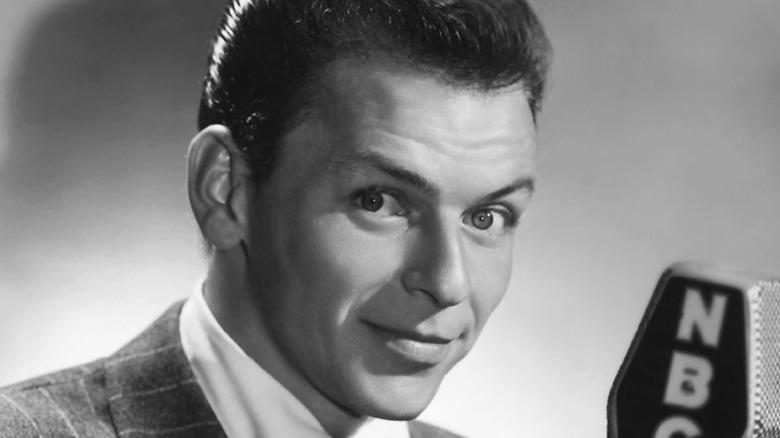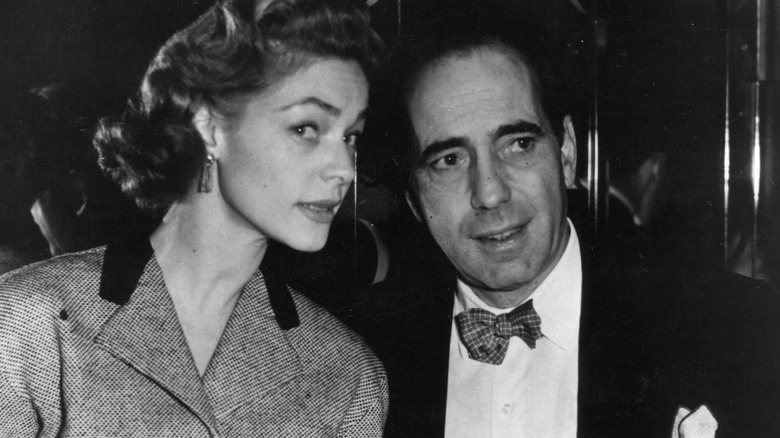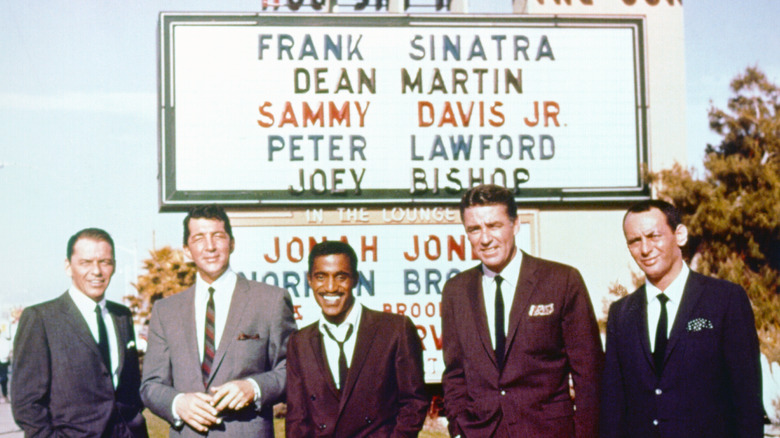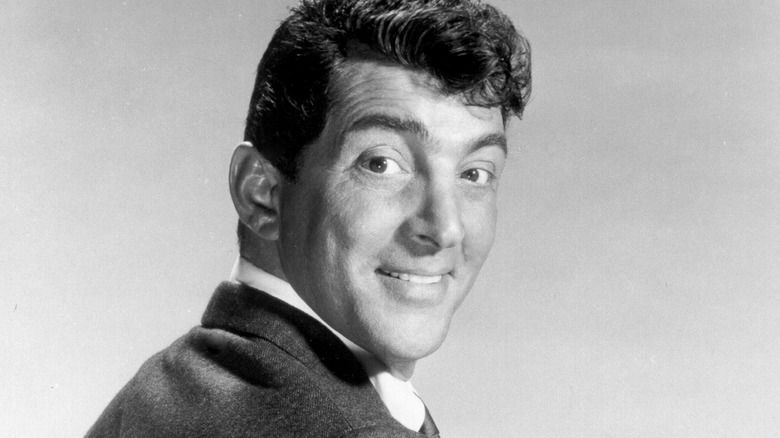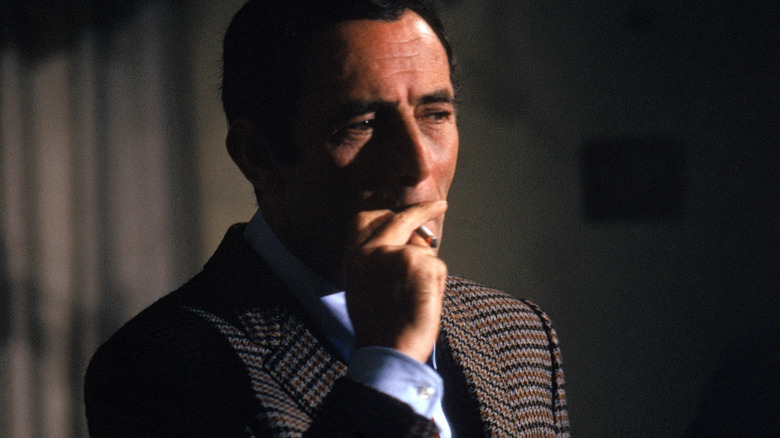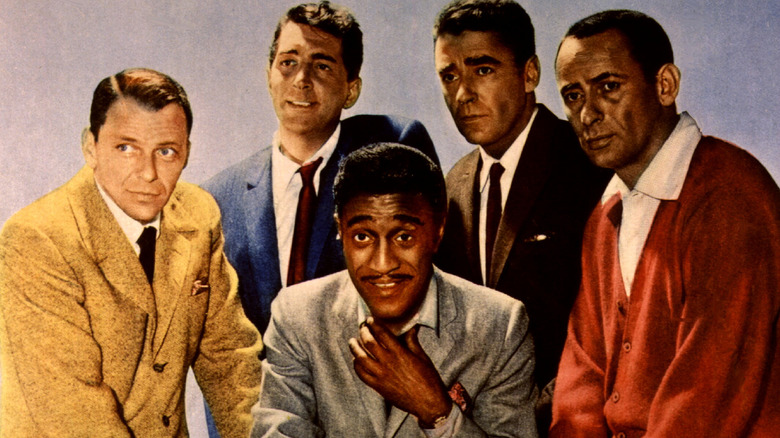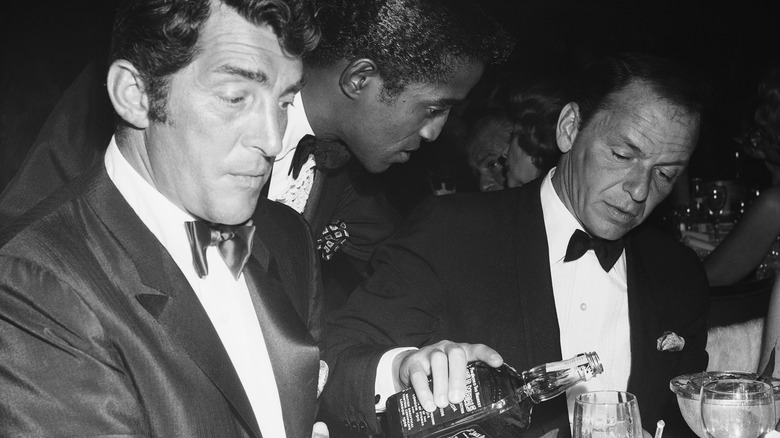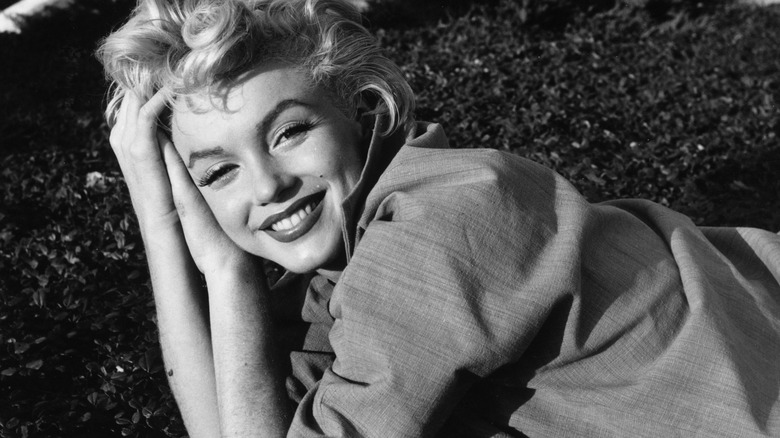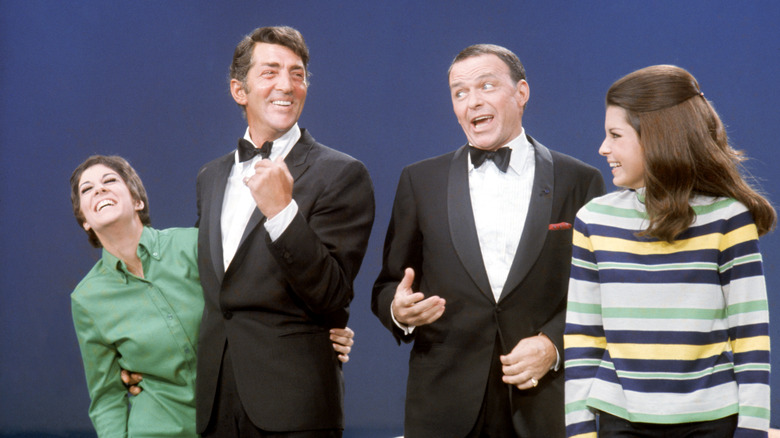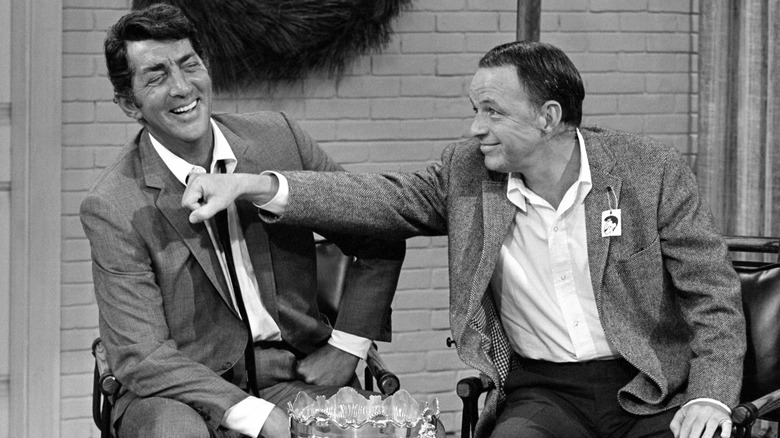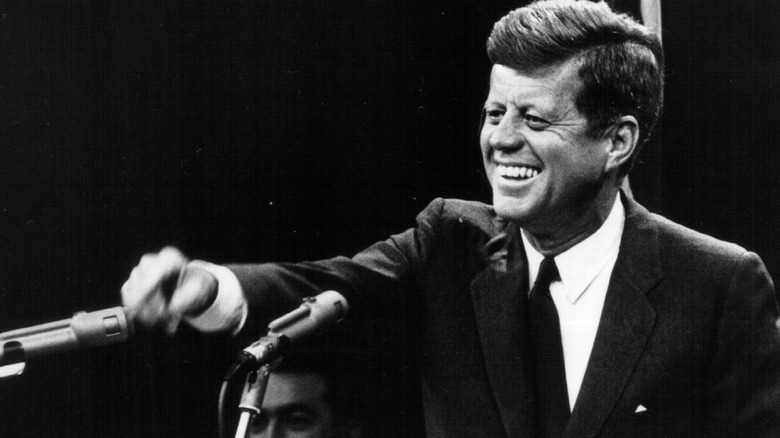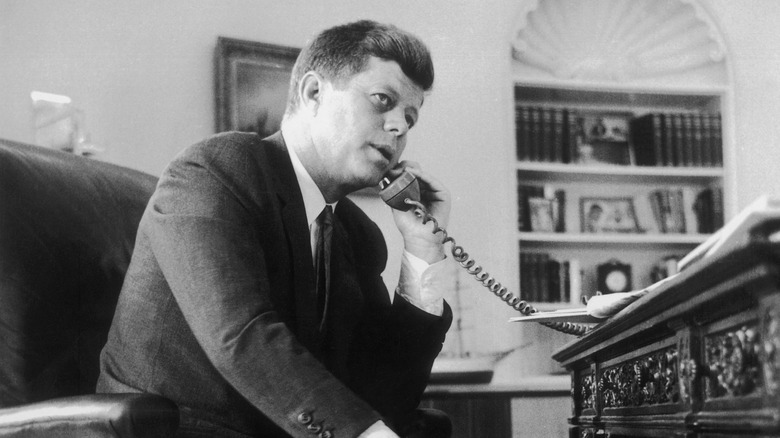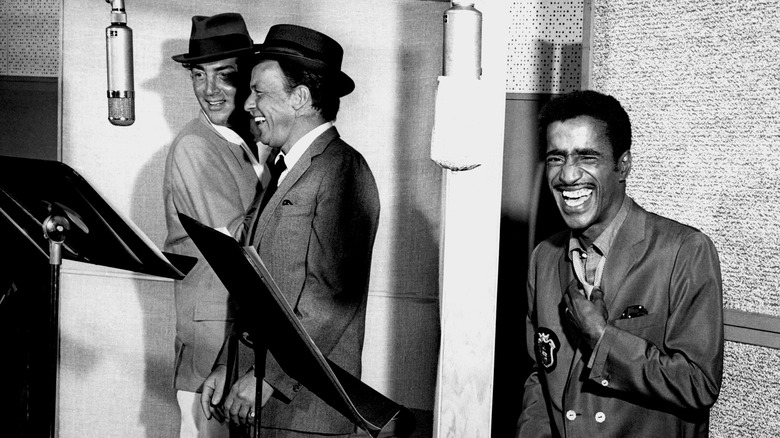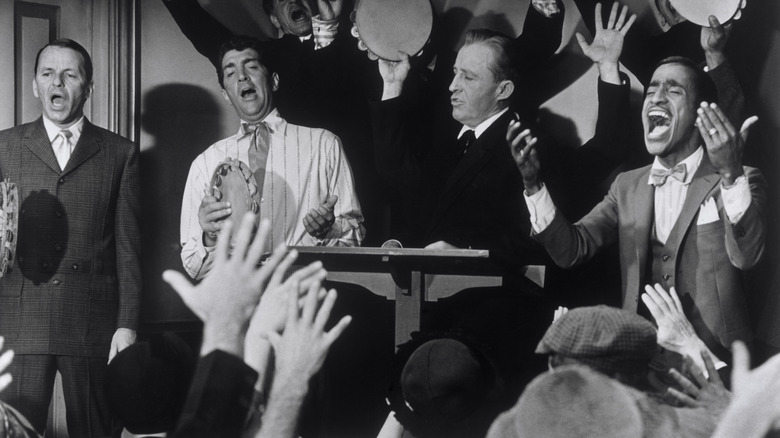The Untold Truth Of The Rat Pack
Was there a more quintessentially cool group of men besides the legendary entertainers known as the Rat Pack? Sure, their style and swagger have tried to be reproduced time and time again (think: Leonardo DiCaprio's "Wolf Pack," or the iconic 1980s Brat Pack), yet all modern iterations pale in comparison to the cultural explosion of the original quintet.
The Rat Pack consisted of singers and actors, led by the group's ringleader, Frank Sinatra. Making up the other core members were Dean Martin, Sammy Davis Jr., Peter Lawford, and Joey Bishop. According to Biography, the Rat Pack was responsible for putting Las Vegas on the map as the ultimate glam tourist destination, and at the height of their popularity in the early '60s, the men attracted a whopping 34,000 fans in a mere four weeks at the Sands Hotel and Casino, all coming to watch them sing, dance, quip, and booze on stage. Sure enough, the men changed popular culture forever, and as Vanity Fair wrote in 1997, it's their "unfading legend" that continues to influence, from the concept of "cocktail hour," to even nostalgic Vegas-based movies such as "Casino," or the 2001 "Ocean's 11" remake.
The public's interest in the Rat Pack is still relevant to this day, as seen with the success of tribute shows that still exist decades later. As such, let's take a look at the untold truth of the Rat Pack.
Humphrey Bogart was the original ringleader
While many people know Frank Sinatra to have been the leader of the Rat Pack, he wasn't actually the one who brought together the group of men. In fact, he wasn't even the one to pick the name, either. According to an article in Life magazine from 1958, the Rat Pack was founded by the late actor Humphrey Bogart — a man who refused to abide by Hollywood norms and one who had "a hatred of phonies." As such, the Holmby Hills Rat Pack (as the public initially called them) were a thrilling group of A-list rebels.
As Bogart's son, Stephen wrote in "Bogart: In Search of My Father," it was his mother, Lauren Bacall, who came up with the group's now-iconic moniker. It turns out, after four days of non-stop partying in Vegas with Bogart and Sinatra in attendance (amongst other soon-to-be members), Bacall took a look at the posse and declared, "You look like a goddamn rat pack."
After Bogie's death in 1957, Sinatra took over as the posse's leader. Yet, Bacall looked at those early days of the A-list group fondly. "The Rat Pack really stood for something," she mused, as recapped by Life magazine. "The Big Sleep" actor elaborated, noting that Bogart was the Director of Public Relations while she took the role of Den Mother. "We had principles," Bacall explained, adding, "You had to stay up late and get drunk ... woe betide anyone who attacked one of our members."
The Rat Pack lingo
If the Rat Pack already seemed intimidating to the uninitiated, the posse had their own entire lexicon, as well. "[They] communicated in a language of their own," explained socialite Judith Exner in her memoir, "Judith Exner: My Story" (via The Intermediate Period)," noting that the Rat Pack language was a "mixture of slang" combined with the jargon "that originated with hip musicians, comics, hoodlums, and teenagers."
According to CBS News, some examples included calling death "the big casino," while a regular man on the street was referred to as "Clyde." Considering they also saw Las Vegas as the central party hub of the country, the Rat Pack referred to anywhere else as "Dullsville, Ohio." As for ringleader Frank Sinatra himself? As Exner notes, the entertainer had various monikers, including "The Leader," "The General," "The Dago," and even "The Pope."
Interestingly enough, while everyone else referred to the group as the Rat Pack, it wasn't a name that Frank Sinatra was fond of. In fact, he hated it. As revealed by the Las Vegas Sun, while it was a name that the press adopted, the group actually referred to themselves as "The Summit" — a take on "the planned Four Powers Paris Summit in 1960" that was set to include President Dwight Eisenhower, Nikita Khrushchev, Harold Macmillan, and Charles de Gaulle. It never happened due to the U2 spy-plane incident, and as such, Sinatra declared he would host his own "conference of cool."
Dean Martin: the not-so-heavy drinker
Dean Martin was known in Hollywood as "The King of Cool." Oozing with a sort of effortless swagger, Martin actually didn't even rehearse for his iconic comedy series, "The Dean Martin Show" — instead choosing to rely on his own jokes and unmistakable stage presence.
Of course, this persona also worked well as a member of the Rat Pack. Considering the group was known for their alcohol-filled antics, Martin somehow became known as the posse's greatest boozehound. In fact, per Biography, Frank Sinatra was even known to joke about his pal, "He's got a tan because he found a bar with a skylight." According to the Desert Sun, the performer adopted his on-stage persona and would always take to the stage with a whiskey cocktail in hand. This would leave group member Sammy Davis Jr. with a running gag whenever he took a sip of the comedian's drink: "If this don't straighten my hair, nothing will."
And while Martin's shtick certainly worked, those who knew him best knew it was all for show. It turns out that the whiskey that Dino had on stage was actually apple juice — Martinelli brand. As Patti Gribow, Martin's former backup singer told the Desert Sun, although Dino would slur his words on stage and act like "a skirt chaser," in reality, he was really "just a sweetheart of a guy."
Joey Bishop was the mastermind jokester
Joey Bishop was a Rat Pack member that wasn't talked about as much but was a crucial part of the group's success. As revealed by TCM, Bishop took an interest in singing, dancing, and music at a young age. Soon enough, by 18, he "[formed] a comedy vaudeville act" with his brother and eventually began performing comedy routines on his own. By the early '50s, his comedy club routine was noticed by Frank Sinatra, who took him under his wing "as an opening act."
In the early 1960s (the Rat Pack's heyday), audiences were wowed by the casual banter on stage -– notably from Sinatra and Dean Martin. "[Bishop] wrote almost all the jokes they all did," recalled comedian Sandy Hackett after Bishop's death (via Tampa Bay Times). As Deadline notes, it was the comedian's quippy retorts and "deadpan delivery" that Sinatra appreciated — and was particularly useful in front of audiences.
Sadly, Bishop never saw the same sort of incredible success as his Pack peers. Per TCM, this meant he was generally "overshadowed" by Sinatra, Martin, and Sammy Davis Jr., while fellow member Peter Lawford was the brother-in-law of President John F. Kennedy. As Richard Lertzman, author of "Deconstructing the Rat Pack" told Deadline, after his Rat Pack success in the '60s, Bishop became the star of his own sitcom, yet it was an "uneasy fit," and he was bitter that "aspects of his career [outside the Rat Pack] were being ignored." "The Joey Bishop Show" lasted only two seasons.
Did they have ties to the mob?
Frank Sinatra's off-stage antics were closely monitored by the FBI for over an incredible 40 years — dating all the way back to the 1940s while his star was still rising. According to History, while the singer never admitted to any sort of gang ties, it's clear that he was (at one point or another) "close friends" with Chicago mob boss Sam Giancana, while he was also seen interacting with Anthony and Vito Giacalone of Detroit, and Philadelphia mobster Angelo Bruno.
So, where does the rest of Ol Blue Eyes' Rat Pack fit into this? Well, they certainly performed in casinos owned by the mob — which the Las Vegas Sun notes "was common for any entertainer in Las Vegas" during the group's prime. While it's unclear if the Rat Pack enjoyed these appearances, their December 1962 performance at the mob-run Villa Venice in Northbrook, Illinois, must have been somewhat nerve-wracking.
According to "Mafia Spies," excerpted by the Chicago Sun-Times, after Giancana was a part of a failed CIA plot to kill Fidel Castro (in return for the government to stop investigating him), he blamed Sinatra. The singer, who was friends with the Kennedys, couldn't persuade them to leave Giancana alone, infuriating the mob boss. Instead of going with the suggested plot of killing the entire Rat Pack, Giancana forced the men to "perform for free at the Villa Venice" — which they did, for Giancana and the "top mobsters" in the country.
Beef within the Rat Pack
In 1958, Life magazine dubbed Frank Sinatra a "social monarch" of the times, with the Rat Pack becoming the new A-list posse that "really matter[ed]." As Rat Pack biographer, Richard A. Lertzman, told Fox News in 2021, "to this day," the group of entertainers was known for their hard-partying antics both before and after shows, and to a degree, this was correct–– at least for a few members. It's something Sammy Davis Jr. elaborated on during the Rat Pack's 1958 Life feature, dubbing himself and Sinatra as the "troublemakers."
And while Davis was ready to party with Ol' Blue Eyes, not everyone was quick to follow his lead — and this would bother Sinatra. According to the Desert Sun, while Dean Martin may have shared the closest relationship with Sinatra, he always put his family first, refusing to stay up late boozing with his pals. "If Dean wanted to go to bed, Dean would go to bed," recalled Sinatra's opening comic, Tom Dreesen. "It would piss Frank [off]."
But Martin wasn't the only one who got on the singer's nerves. In fact, a spat with fellow Pack member Joey Bishop resulted in his ejection from the group. As Lertzman revealed to Fox News, Bishop let the Rat Pack fame get to his head, and when Sinatra asked him to go do a performance as a favor, the comic demanded "$50,000 and a private jet." This didn't sit well with Sinatra, who immediately ousted him from the group.
Marilyn Monroe: a Rat Pack 'mascot'
Frank Sinatra, Dean Martin, Sammy Davis Jr., Peter Lawford, and Joey Bishop were the core five members of the Rat Pack — but it doesn't mean they didn't have A-list supporters that also advocated for their antics. Some of these so-called "mascots" included Shirley MacLaine, Angie Dickinson, and Juliet Prowse (via Desert Sun). Their most high-profile name, however, was none other than Marilyn Monroe — and the group of lads supported her, too.
It turns out that Sinatra and Monroe were quite close friends, while it was Lawford's idea to have the star sing the now-iconic "Happy Birthday, Mr. President" in 1962 for President John F. Kennedy. According to Vanity Fair, Lawford married Patricia Kennedy in 1954, solidifying his status with the presidential family as a brother-in-law to the president. In fact, it was Lawford himself who allegedly introduced JFK to the actor, thus sparking their purported affair.
Lastly, Monroe had none other than Martin himself to thank after she almost got booted on the set of "Something's Gotta Give." According to "Uncle John's Supremely Satisfying Bathroom Reader," the actor's "erratic behavior" almost resulted in Monroe's firing, yet when Martin threatened to quit as well, she was promptly re-hired. Sadly, Monroe died in 1962 before filming was completed.
Dean Martin and Frank Sinatra's families were incredibly close
There's no denying the camaraderie and warmth that the core Rat Pack members shared, yet the relationship between Dean Martin and Frank Sinatra was probably the strongest of them all. "To watch them on stage together was brilliant because you could see the love in their eyes, the respect for each other," Dean's daughter, Deana Martin, shared with the Desert Sun in 2015.
The two performers were friends for an incredible 40 years, and were so close, in fact, that Sinatra had "matching pinky rings ... each with an emerald-cut diamond" made for the both of them. Of course, with such a strong bond, it's natural that this extended to their families, as well. Per Desert Sun, both the Martins and the Sinatras spent a lot of time together, and as Deana revealed in her book, "Memories Are Made of This: Dean Martin Through His Daughter's Eyes," she even considered Frank's daughter, Tina Sinatra, her "best friend" at one point. "The Sinatras were a big part of our lives," Dean's daughter wrote, adding, "Tina and I hung out together all the time."
That's not to say the two performers didn't have their squabbles, either. As Tom Dreesen, Frank's opening comic, told Desert Sun, the pair began to have a "falling out" when Dean would refuse to party with his longtime chum. Thankfully, as Dreesen noted, the duo became close again "before they died," after Dean "checked himself into the hospital for kidney issues."
Frank Sinatra and Dean Martin's plane crash connection
On January 9th, 1977, Frank Sinatra's mother, 82-year-old Natalie Della Garaventa, was found dead along with three other people on Mount San Gorgonio, Southern California's highest mountain. According to The New York Times, the elder Sinatra boarded a plane en route to watch her son perform at Caesar's Palace in Las Vegas, when "the private jet hit a cliff at the 9,000‐foot level of the 11,502‐foot‐high mountain."
If that's not heartbreaking enough, precisely 10 years later, Rat Pack member Dean Martin received word in March when his son, Dean Paul Martin, also died in a plane crash — with his fighter jet crashing into the same mountain due to heavy clouds, per AP. According to Desert Sun, "Dino," as his family called him, was a Captain in the Air National Guard, so when the jet disappeared from radars ten minutes after takeoff, the California Air National Guard was alarmed.
Search crews began looking for the plane for four days, while Frank Sinatra, who was also shaken up after the news, phoned his friend. "If there's anything I can do, pal," the singer told a grief-stricken Dean, who merely thanked him and hung up (via "Memories Are Made of This: Dean Martin Through His Daughter's Eyes"). Sadly, Dino's jet was eventually found on the foothills without any survivors.
The Jack Pack
Long before President Joe Biden had the support of celebrity endorsements such as that of Taylor Swift and Cardi B, America's 35th President, John F. Kennedy had his very own "Jack Pack." According to Biography, while it's unclear when the Rat Pack was first introduced to JFK, they had a mutual connection through Pack member Peter Lawford — who was married to Kennedy's sister, Patricia. As the outlet notes, nearing the end of the '50s, they all knew each other quite well.
As noted by The Pop History Dig, during Kennedy's election run in 1960, he received support from the Rat Pack members, backing him by appearing at various fundraisers and dinners held at restaurants owned both by Lawford and Frank Sinatra. If that's not all, whenever JFK would come to a Rat Pack show, he was usually sat at the front — an easy spot for Sinatra to declare things like, "Ladies and gentlemen, Senator John F. Kennedy from the great state of Massachusetts, the next President of the United States."
Of course, the star power of the legendary performers simply worked. As Biography explains, Sinatra "represented the glamor of Hollywood," while the rest of the men (Lawford, Joey Bishop, Sammy Davis Jr., and Dean Martin) "projected an image of urban sophisticates" who gave off an air of ease on stage and played by their own rules. Sadly, just as quickly as Sinatra's friendship with Kennedy blossomed, it also eventually came to an abrupt stop, too.
They felt betrayed by JFK
John F. Kennedy was once quite close with the Rat Pack, with the men even singing "The Star-Spangled Banner" at 1960's Democratic National Convention in Los Angeles (via CBS News). Considering the men truly supported the then-presidential candidate during his election run, it came as quite a blow when their relationship suddenly changed after Kennedy was elected president.
One blow came on the day of JFK's inauguration. As detailed by Fox News, it was due to Sammy Davis Jr.'s 1960 interracial wedding to white actor May Britt that didn't sit well with the American public, causing the singer to simply not be invited to Kennedy's 1961 inauguration. As a result, fellow Rat Pack member Dean Martin decided to forgo the ceremony as well, as a stand of solidarity. "That really impressed me," recalled Tom Donahue, director of "Dean Martin: King of Cool," who added, "He had a sense of honor."
Things didn't get better as time went on, either, as Kennedy then began to distance himself even further from the A-listers — due to their alleged ties with the mob in Las Vegas (via CBS News). The final snub came for Frank Sinatra. According to "The Immortal Marilyn," after the performer spent time preparing his California home for a presidential visit, he discovered that Kennedy (at the last moment) had elected to go stay with Bing Crosby instead. Per Biography, Sinatra "proceeded to smash everything in sight."
The end of the Rat Pack
During their heyday, the Rat Pack personified the glitz and glam of the late '50s and early 1960s. As Biography so perfectly puts it, the men "taught America to swing in the first half of the sixties" — yet that all changed after a few significant (and jarring) occurrences.
According to "The Immortal Marilyn: The Depiction of an Icon," the downfall of the Rat Pack began with John F. Kennedy becoming president in 1961. After Kennedy started distancing himself from Frank Sinatra mainly due to his alleged mob connection, the singer put the blame on fellow Pack member Peter Lawford — JFK's brother-in-law. Cutting Lawford out of the group meant the rest of the men slowly drifted apart, as well, while one of their Rat Pack "mascots," Marilyn Monroe, was found dead the following year. Terrible news only kept coming with Kennedy's assassination in 1963, and as "The Immortal Marilyn" writes, an era was suddenly "[coming] to a bitter ending."
1963 also signified a massive change in the consumption of pop culture. According to Biography, the "British Invasion" of The Beatles, The Rolling Stones, and other rock bands was a complete change from the Rat Pack. As author of "Deconstructing the Rat Pack," Richard Lertzman told Deadline, the "five puffy nightclub performers in tuxedos became the very antithesis of cool."
Not everyone liked the Rat Pack
Whenever the Rat Pack took the stage for one of their shows or comedy sketches, it was hard not to be mesmerized by their casual banter and charming personalities. Yet, they didn't exactly always have a positive effect on all audiences.
As "Rat Pack Confidential" notes, a scathing review of one of their shows was published by Variety that declared that "the audience was not amused," while another reviewer stated that a tinge of "audience resentment" was in the air. Sure enough, by today's standards, the shows were undoubtedly discriminatory, "including put-downs of ethnic minority groups ... and women" (via "American History Through a Whiskey Glass"). If that's not all, their work ethic was, at times, questionable. The men had a packed schedule during their heyday, performing in Las Vegas in the evening, drinking afterward, and proceeding to shoot films in the morning. As The Seattle Times observed after watching the original "Ocean's 11," it's easy to notice the Rat Pack looking quite "bleary-eyed" — a result of their hard-partying antics.
Dean Martin's daughter, Deana, reflected on the Rat Pack's success in 2018 during a conversation with Daily News, noting that the men wouldn't have achieved such widespread appeal in today's era of movements such as #MeToo. "I don't know if they would have survived," she opined.
